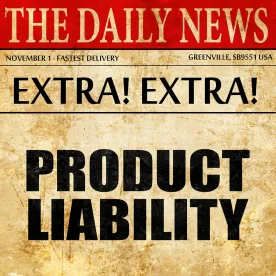Companies often communicate with government agencies directly or through trade associations for a variety of reasons. But what happens when an adverse party tries to use comments made to the government or membership in an advocacy group as evidence in litigation?
Manufacturers facing product liability claims may be able to borrow a defense from the world of antitrust litigation to protect their lobbying efforts. Under the Noerr-Pennington doctrine, defendants sometimes can avoid liability for exercising their First Amendment right to petition or seek redress from the government. Since the doctrine was developed, courts have expanded its use outside of the antitrust context. We explore how this doctrine may be applied in product liability cases.
Origins of the Noerr-Pennington Doctrine in Antitrust Claims
The Noerr-Pennington doctrine takes its name from two U.S. Supreme Court decisions involving the Sherman Antitrust Act.[1] In Eastern R.R. Presidents Conference v. Noerr Motor Freight, railroad companies petitioned Congress and state legislatures to pass legislation making it harder for trucking companies to enter the transportation industry.
The Court admitted that the goal – blocking a potential competitor – could lead to an improper restraint against trade under the Sherman Antitrust Act. All the same, the Court reasoned that the Sherman Act did not override the right to petition the government.[2] Since the defendants sought a lawful and protected means of influencing government decision making, their advocacy could not give rise to antitrust liability
Likewise, in United Mine Workers v. Pennington, a union and large mining company petitioned the Labor Department to raise the industry’s minimum wage. Plaintiffs sued alleging that both organizations sought to price out smaller mining companies. The Court again held that the defendants’ lobbying sought a goal contrary to the Act, however, the First Amendment protected their advocacy. Specifically, the defendants exercised the freedom of association and the right to petition the government.[3]
Covered Activities and the “Sham” Exception
The Supreme Court explored what activities are considered “petitioning” the government in California Motor Transport Company v. Trucking Unlimited. [4] It held that the Noerr-Pennington doctrine applied to appeals made to any government department – legislative, executive, judicial, and administrative. Thus, two activities may fall under the protection of the doctrine: legislative lobbying[5] pertaining to a trade association that lobbies the government,[6] and filing litigation.[7]
One carve-out from the Noerr-Pennington doctrine is the “sham” exception. The Supreme Court has held that the doctrine does not apply to situations when the petitioner does not seek a governmental result, but rather merely uses the petitioning process to obstruct the other party’s objectives.[8] If a party, for example, files a series of trivial lawsuits[9] or merely communicates with a government agency without an attempt to influence its decision making,[10] the doctrine might not apply.
Ultimately, the party opposing the application of the Noerr-Pennington doctrine bears the burden to show both objective and subjective reasons that an opposing party’s government petition was a sham.[11]
Application of the Noerr-Pennington Doctrine to Tort Claims
Though the Noerr-Pennington doctrine emerged in the antitrust context, lower federal courts and state courts have applied the same principles to other types of claims, such as business interference[12] and common law tort claims.[13]
In line with this development, courts also have held that the Noerr-Pennington doctrine applies to claims arising in product liability suits. In Hamilton v. AccuTek, for example, the court granted summary judgment in favor of gun manufacturers for product liability and fraud claims in part because the manufacturers’ attempts to influence federal policies were lawful lobbying attempts.[14] Likewise, in In re Municipal Stormwater Pond, the court dismissed fraudulent misrepresentation or concealment claims against a coal tar sealant manufacturer because the Noerr-Pennington doctrine immunized its lobbying efforts before state and local governments.[15] In other cases, the Noerr-Pennington doctrine has been utilized to prevent admission of evidence of a manufacturer’s lobbying in products liability claims.[16]
These cases show that manufacturers can continue their advocacy efforts with some reassurance that their statements may not lead to future liability. There may be other applications of the doctrine. For example, manufacturers may wish to consider using Noerr-Pennington to exclude evidence of lobbying in all phases of litigation. In all cases, manufacturers should strategically consider the doctrine to challenge these claims.
FOOTNOTES
[1] Eastern R.R. Presidents Conference v. Noerr Motor Freight, 365 U.S. 127 (1961); United Mine Workers v. Pennington, 381 U.S. 657 (1965).
[2] Noerr, 365 U.S. at 140-41.
[3] Pennington, 381 U.S. at 670.
[4] California Motor Transport Company v. Trucking Unlimited, 404 U.S. 508, 509-10 (1972).
[5] Allied Tube & Conduit Corp. v. Indian Head, Inc., 486 U.S. 492, 499 (1988).
[6] Diaz v. Southwest Wheel, Inc., 736 S.W.2d 770 (Tex. App. 1987).
[7] Prof'l Real Estate Inv'rs, Inc. v. Columbia Pictures Indus., 508 U.S. 49, 60-61 (1993).
[8] City of Columbia v. Omni outdoor Advertising, Inc., 499 U.S. 365, 380 (1991).
[9] Kottle v. Nw. Kidney Ctrs., 146 F.3d 1056 (9th Cir. 1998).
[10] Litton Systems v. American Telephone & Telegraph Co., 700 F.2d 785 (2d Cir. 1983).
[11] Prof'l Real Estate Inv'rs, Inc., 508 U.S. at 60-61.
[12] Sierra Club v. Butz, 349 F.Supp. 934 (N.D. Cal 1972).
[13] Video Int’l Prod., Inc. v. Warner-Amex Cable Comm., Inc., 858 F.2d 1075, 1084 (5th Cir. 1988).
[14] Hamilton v. Accu-Tek, 935 F. Supp. 1307, 1321 (E.D.N.Y. 1996).
[15] In re Mun. Stormwater Pond, No. 18-cv-3495 (JNE/KMM), 2019 U.S. Dist. LEXIS 227887, at *12 (D. Minn. Dec. 20, 2019).
[16] Eiser v. Brown & Williamson Tobacco Corp., 2005 Phila. Ct. Com. Pl. LEXIS 43, *20, 2005 WL 1323030.





 />i
/>i

